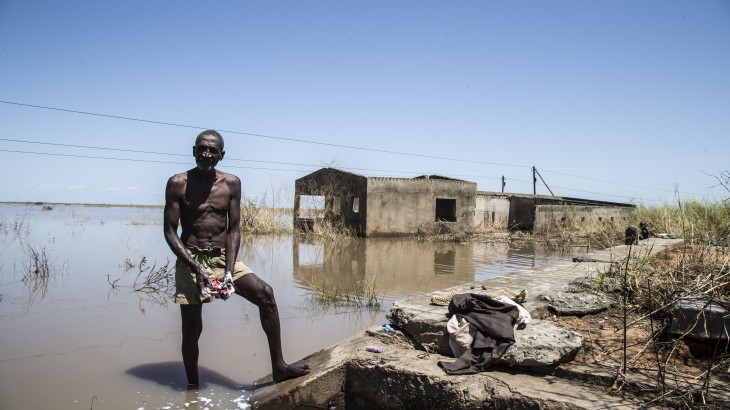Operational update on Cyclone Idai: Destruction and anguish as thousands remain homeless

Geneva (ICRC) - As flood-waters from Cyclone Idai recede, the scale of the devastation left behind is becoming clearer. But, worryingly, some of the hardest hit communities remain cut off from outside assistance. Tens of thousands of people are homeless, and hundreds of families have been separated.
In order to support communities reeling from the storm in Mozambique, Zimbabwe and Malawi, the International Committee of the Red Cross (ICRC) is working with the International Federation of Red Cross and Red Crescent Societies (IFRC) and national Red Cross societies to provide assistance.
“As we reached remote communities cut-off by flooding and landslides, we are struck by the resilience that people have despite the tremendous hardship. We are rapidly deploying our teams of water, livelihoods and health specialists to assess and address their immediate needs,” said Hicham Mandoudi, who is leading the ICRC’s relief efforts from Chimoio, Mozambique.
“The challenge for us is that the burials are very shallow. It’s not a burial as much as a clump of trees and debris that people put on the body. Very soon that would be moved by the wind, the rain and the water, so that body will just reappear and require another more permanent burial,” said Stephen Fonseca, the ICRC’s forensics specialist on the ground in Mozambique.
HUMANITARIAN CONCERNS
- Tens of thousands of people have been left homeless by the storm. Even as the water levels go down, many communities are still stranded and living completely exposed to the elements.
- Many of the most affected areas are still not reachable by vehicle in Zimbabwe and Mozambique. The destruction of key roads, bridges and other infrastructure makes it complicated for humanitarian agencies to reach them.
- Stranded communities are relying on heavily polluted water. This, combined with widespread flooding and poor sanitation, creates fertile grounds for disease outbreaks, including cholera. Malaria cases could also increase, with people living outside near stagnant water.
- There is an urgent need for health care supplies and water in Estaquinha (Buzi district, Sofala province) and Espungabera (Mossurize district, Manica province), where communities have been largely cut-off after the storm destroyed key infrastructure. They face a growing threat of waterborne disease.
- There are reports of many unaccompanied children after the cyclone. The ICRC teams witnessed more than 100 unaccompanied children near Estaquinha. The scale of separated families will be immense and we do not yet have a true picture of the need.
- Many bodies in Mozambique need to be recovered. The ICRC forensics specialist has been working with authorities in Dombe (Sussundenga district, Manica province), Mozambique to catalogue the dead. However, many of the areas that badly need forensics assistance are not yet reachable.
- Dombe is also in need of food, household items and medical supplies. Many people are sheltering in tents and schools. The hospital in Dombe is without power and cases of diarrhea are reported. This is just one community of many that need the very basics two weeks after the storm hit.
OPERATIONAL NOTES
- Teams are being deployed from the ICRC’s new logistics base in Chimoio, Mozambique, to remote communities in Manica and Sofala provinces to assess the most pressing needs and provide immediate assistance. Distributions of relief supplies started this week and will continue for the coming month with communities receiving blankets, tarpaulins and kitchen sets.
- The ICRC delivered medical and surgical items by helicopter and road to Nhamatanda Hospital in Mozambique, which serves over 325,000 people. The donation will help address the increasing number of cases of malaria, diarrhea, injuries and respiratory infections that the health care staff have been reporting.
- In coordination with the Ministry of Health, the ICRC has donated and transported medical supplies to hospitals and rural clinics in eastern Zimbabwe caring for the sick and injured.
- Staff are working with national Red Cross societies in Mozambique, Zimbabwe and Malawi to set up systems to reconnect separated family members. This includes registering details of people who are missing and offering free phone calls for people to get in touch with their loved ones and let them know they are safe.
- The Restoring Family Links website continues to receive cases of people marking themselves as safe or registering that they are looking for a loved one. As of 27 March, approximately 250 people were registered as missing. We expect more cases to be registered in the coming weeks, as our team continues their work to register people without access to internet or mobile network by-hand.
- A forensics specialist is working in remote communities with Mozambican authorities to manage the dead in a dignified way. This includes documenting the dead and creating marked graves in the hope of giving grieving families closure. The ICRC also donated body bags to authorities in Mozambique and Zimbabwe.
- The work is being carried out as part of a wider Red Cross response effort, led by the IFRC and national Red Cross teams. With the first cholera cases confirmed by Mozambican health authorities, the IFRC and Mozambique Red Cross are moving quickly to curb the spread of disease. Mozambique Red Cross volunteers are trained in cholera management and have worked in previous outbreaks. They will be providing supplies for household water treatment – one of the most effective ways to prevent cholera. Red Cross emergency response teams, led by the IFRC, are also setting up systems that will soon provide sanitation for 20,000 people and clean water for 15,000 people a day.
For further information, please contact:
Tendayi Sengwe, ICRC Mozambique, tel: +258 850 368 582 / +27 66 476 4446
Crystal Ashley Wells, ICRC Nairobi, tel: +254 716 897 265
